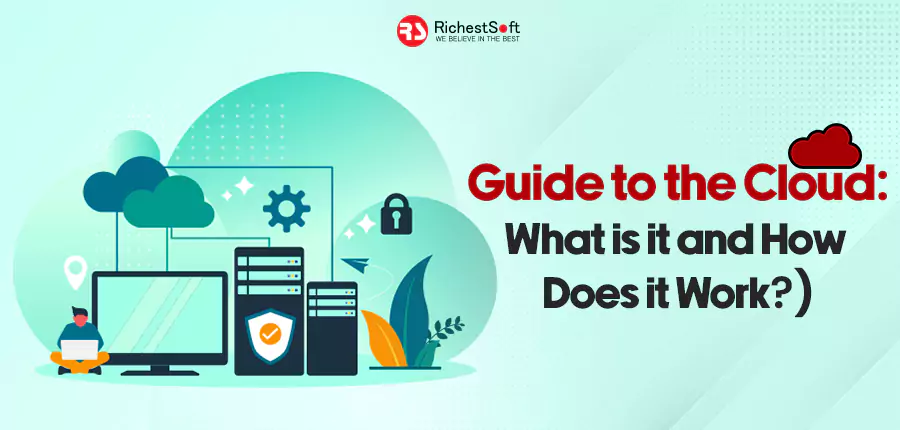Cloud-based application development has become an industry standard for startups and enterprise organizations. The benefits of this type of development are enormous. reduced development costs, a quick time to market, and a more flexible process that allows you to adjust your product based on customer feedback. This article will provide insight into the development process and outline the costs associated with developing an application in a cloud environment.
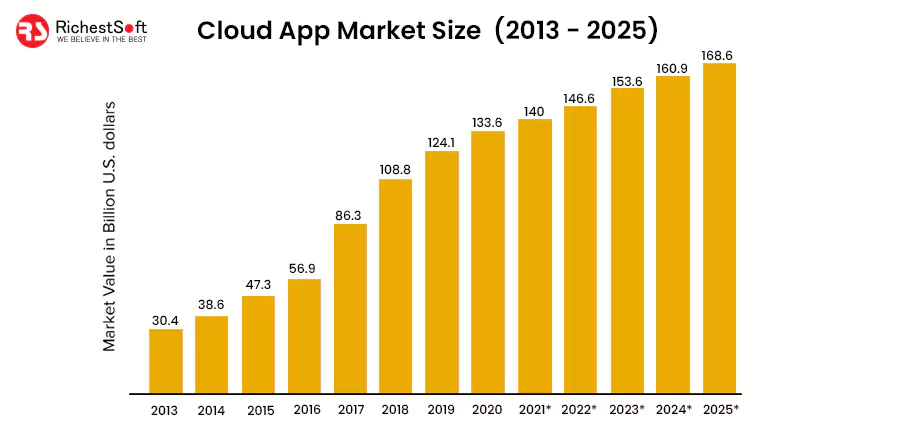
According to Statista.com, the global cloud applications market had a value of 133.6 billion U.S. dollars in 2021 and it is expected to reach 168.6 billion U.S. dollars by 2025.
What is cloud application development?
The term “cloud-based” refers to applications, services, or resources that are provided over the internet through a cloud computing platform. Cloud-based application development is the process of creating software applications that reside and run on a cloud platform.

A cloud-based app is a program that runs over the internet and has parts that store and run online. Some or all of the processes run in the cloud. To get a better idea of how this works, think about how a user interacts with cloud-based apps: through a web or mobile browser. In this case, the data processing happens on the remote server bae and is controlled by an API. In a cloud app, a user’s device only acts as an input device and doesn’t affect the main process.
A web-based app is not the same as a cloud-based app. To understand what makes cloud app development unique, it’s important to look at a few of the things that make it what it is.
Characteristics of Cloud-Based Application Development

There are numerous characteristics that can be included in a cloud-based application, but some of the most popular and beneficial ones include:
Scalability
The ability to scale up or down as needed is one of the biggest advantages of using a cloud-based application. This means that you only pay for the resources you use, and can easily add more when needed.
Flexibility
Cloud-based applications are also extremely flexible, allowing you to customize them to fit your specific needs.
Security
Cloud-based applications offer a high level of security, keeping your data safe and secure.
Increased Reliability
Cloud platforms are designed for high availability and reliability, meaning that applications built on these platforms are less likely to experience downtime.
Easier Management
Cloud-based applications can be managed remotely, which can simplify administration and reduce management costs.
Types of Cloud-based solutions available for enterprises
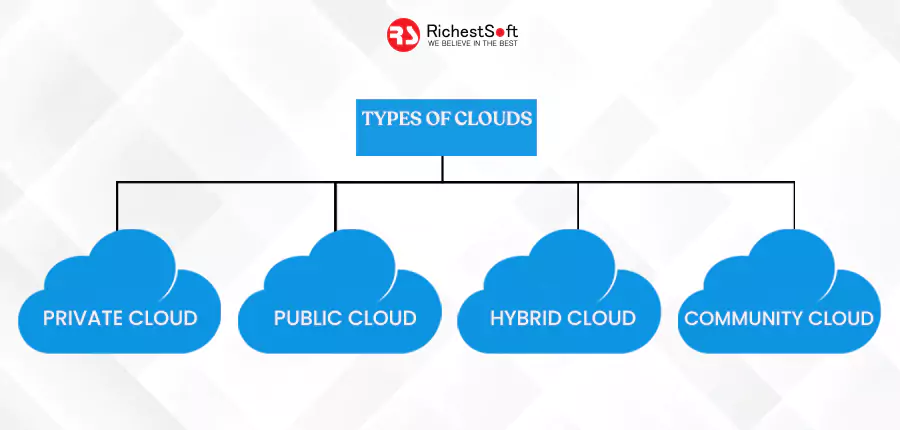
The resources and services that makeup cloud computing technology, such as databases, data servers, storage, etc., are managed by outside companies. The third-party grants permission for the infrastructure and computer reserves on a free or compensated basis. In other words, you don’t have to worry about infrastructure upkeep if you use the services, resources, and space.
Also Read | Top 15 databases for web applications to use in 2023
There are four crucial cloud deployment types offered to businesses:
1. Private Cloud
This serves as a private web system with a safe location for data, web applications, and other online resources. One corporation uses a private cloud service that is not accessible to the public.
2. Public Cloud
Only authorized devices can access the data in a public cloud resource. Public clouds typically provide the best combination of cost and processing flexibility.
3. Hybrid Cloud
Hybrid cloud is used for both public and private cloud app development. Here, you can spread the data among third-party apps and on-device services, as well as choose from a variety of extra deployment and optimization options.
4. Community Cloud
The deployment of a community cloud is comparable to that of a private cloud, with the exception that here, data exchange occurs between two (or more) businesses. For instance, a nation’s government may have numerous internal departments that require the same infrastructure and resources. In such cases, community clouds can be useful.
The aforementioned cloud deployment options can be used for a variety of application services.
For businesses, there are numerous cloud application development alternatives accessible, similar to the deployment services.
Types of Cloud-based software development
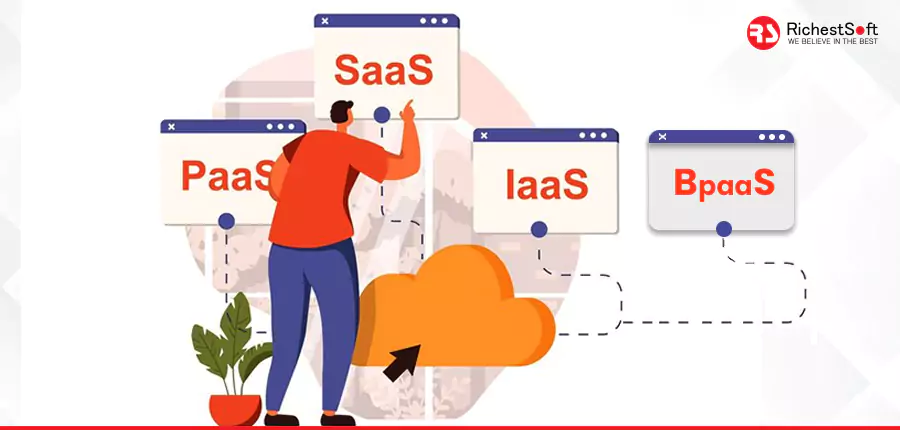
Platform as a Service (PaaS)
PaaS is a cloud computing platform that allows enterprises to develop, test, and deploy applications without the need for infrastructure or middleware. PaaS providers typically offer a variety of tools and services, such as storage, databases, messaging, and collaboration tools.
Infrastructure as a Service (IaaS)
IaaS is a cloud computing platform that provides enterprises with access to physical or virtual resources, such as servers, storage, networks, and software. IaaS providers usually offer pay-as-you-go pricing models and self-service management interfaces.
Software as a Service (SaaS)
SaaS is a software distribution model in which enterprise applications are hosted by the provider and accessed by users over the internet. SaaS applications are typically delivered on a subscription basis and can be accessed from any internet-connected device.
Business Process as a Service (BPaaS)
This is a cloud platform that enables businesses to outsource their business processes, such as customer relationship management or human resource management, to a third-party provider.
Each of these cloud-based solutions has its own advantages and disadvantages, so it’s important to choose the one that best suits your needs.
Benefits of the Cloud-based application development

The cloud has become an increasingly popular option for businesses of all sizes when it comes to storing data and running applications. There are many benefits to using a cloud application development platform, including the ability to scale quickly, reduced costs, and increased flexibility.
1. Increased flexibility and scalability
With a cloud-based app, you can quickly scale up or down according to your needs, without having to install or uninstall anything locally.
2. Reduced IT costs
Cloud-based apps can be cheaper to run than traditional software, as you don’t need to invest in local hardware or maintenance.
3. Improved security
As your data is stored remotely, it’s less vulnerable to theft or damage. And as cloud-based apps are updated automatically, you can be confident that your security is always up to date.
4. Anytime, anywhere access
As long as you have an internet connection, you can access your cloud-based app from anywhere in the world. This makes them ideal for businesses with employees who work remotely or travel frequently.
Also Read | Why Cloud-Native App Is the Future of Software Development
Process of Cloud-based application development
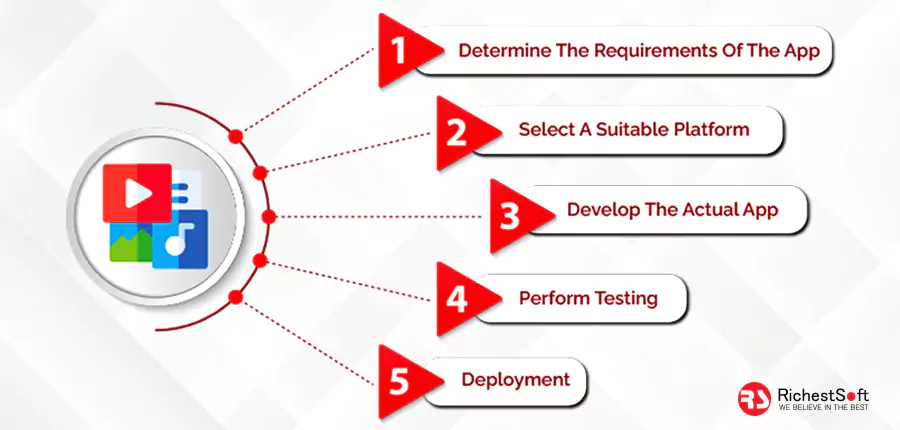
The process of cloud application development is relatively simple and can be completed in a few easy steps.
1. Determine the requirement
The first step is to determine the requirements of the app. This includes understanding the needs of the users and the business goals of the organization
2. Select a suitable platform
Once the requirements are understood, the next step is to select a suitable platform for developing the app. There are many cloud-based platforms available, each with its own set of features and capabilities. The platform selected should be able to meet the specific needs of the app.
3. Develop the app
After selecting a platform, the next step is to develop the actual app. This involves designing and coding the various features of the app.
4. Perform testing
Once the development process is complete, the app must be tested to ensure that it meets all the required standards.
5. Deployment
After testing, the app can then be deployed on a cloud-based platform for use by users.
Cost of the Cloud-based application development

- The cost of cloud application development can vary depending on the features and complexity of the app.
- The average cost of developing a cloud-based app is $50,000 – $250,000. However, if you’re looking for a more custom or complex app, the cost can increase to $1 million or more.
- To get an accurate estimate of the cost of your cloud-based app project, it’s best to consult with a development team that has experience in building similar apps. They will be able to give you a better idea of what to expect in terms of costs and timelines.
Tech challenges in cloud-based app development
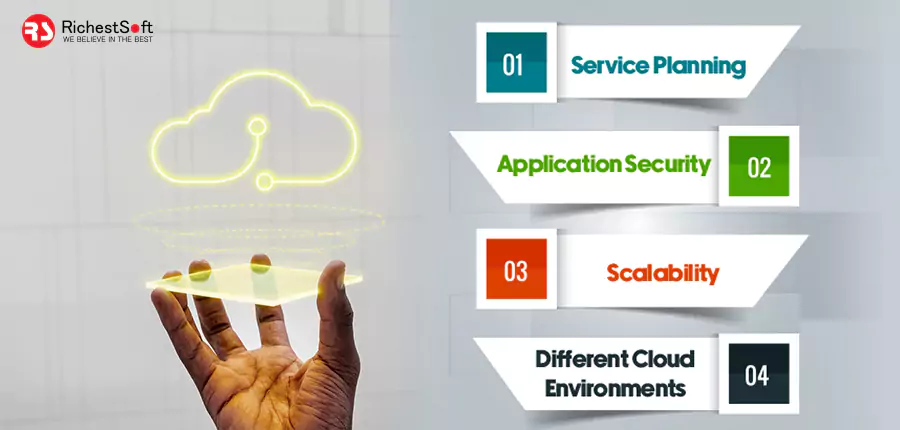
The cloud has been a game-changer for the tech industry, providing new opportunities for businesses to develop and deploy applications. However, there are also challenges that need to be overcome when it comes to developing cloud-based apps.
Service Planning
In a customer-centric environment, it is crucial for cloud apps to be closely integrated with service logic and implementations. While straightforward in concept and technology, creating adaptable and reusable components that adhere to service features can be challenging for cloud app developers.
Application Security
One of the main challenges is ensuring that the app is secure. With data being stored in the cloud, there is a greater risk of it being hacked or leaked. This means that developers need to build security into their apps from the ground up.
Scalability
Another challenge is dealing with scalability. As apps grow in popularity, they can suddenly receive a lot of traffic, which can lead to them crashing. Developers need to design their apps to be able to handle large amounts of traffic without issue.
Different Cloud Environments
Finally, there is also the challenge of dealing with different cloud environments. Not all clouds are created equal and each one has its own set of capabilities and limitations. Developers need to be aware of these differences in order to make sure that their app runs smoothly in any environment.
FAQs
1. What is cloud application development?
A. Cloud application development is the process of designing, creating, testing, and deploying applications that run in the cloud. Cloud apps are designed to take advantage of the scalability, flexibility, and security of the cloud.
2. What is the most common cloud application example?
A. Cloud application is something like Google Docs or Office 365. You only need a device that can run a web browser or an internet connection to use any of these cloud applications. The remote servers provide functionality, user interface, and data storage.
3. Why will cloud computing be the next big thing in technology?
A. Cloud computing is the future of modern technology because it allows for faster deployment of new applications, more flexibility in terms of scaling, and more efficient use of resources. Additionally, cloud computing enables new levels of collaboration and helps to drive down the cost of IT infrastructure.
 +1 315 210 4488
+1 315 210 4488 +91 798 618 8377
+91 798 618 8377